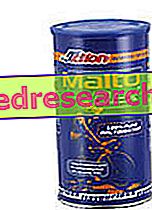Generality
Ornithine alpha-ketogluratate - more briefly referred to as OKG - is a salt consisting of a non-protein amino acid, ornithine, and a protagonist of the Krebs cycle, alpha-ketoglutarate.

Indications
Why is ornithine alpha-ketoglutarate used? What is it for?
Classically, ornithine alpha-ketoglutarate is used both in clinical and sports settings for its immunomodulatory, anticatabolic and anabolic properties.
These properties would prove to be particularly useful during:
- Severe trauma and surgery;
- Extensive burns;
- Energy-protein malnutrition;
- Periods of particular psycho-physical stress;
- Cachexia;
- Sarcopenia.
Despite the excellent results observed in the clinical setting, strong evidence regarding the usefulness of the OKG in sports is still lacking.
Property and Benefits
What benefit has ornithine alpha-ketoglutarate shown during the studies?
The data concerning the efficacy of ornithine alpha-ketoglutarate are somewhat contrasting, as many of experimental origin.
Ornithine alpha-ketoglutarate in the clinical setting
From several studies, some of which are also of a clinical as well as experimental nature, the use of high-dose ornithine alpha-ketoglutarate would have been effective in improving the clinical course in burned, malnourished or particularly invasive surgical procedures.
The anticatabolic action on the one hand and the acceleration on wound healing on the other, would constitute the main mechanisms of action of ornithine alpha-ketoglutarate.
Mechanisms also supported by the immunostimulant role, necessary to reduce the risk of opportunistic infections.
Ornithinta alpha-ketoglutarate in sports
Ornithine alpha-ketogluratate is currently used in sports, despite conflicting opinions and the absence of particularly incisive studies. The controversy concerns the alleged abilities of:
- Increase muscle mass;
- Improve athletic performance;
- Reduce the risk of overtraining;
- Facilitate muscle recovery.
Such activities, which are theoretically justifiable by the biological role of ornithine precursor, would not be directly reflected in the studies or in the various scientific works.
Further developments are therefore expected in this regard.
Doses and method of use
How to use ornithine alpha-ketoglutarate
The doses of ornithine alpha-ketoglutarate vary considerably according to the need for integration.
In sports, for example, it is usually suggested to take 2.5 grams daily of OKG, divided into pre and post-workout or pre-sleep intake.
In the clinical setting, for example in the case of burns or severe surgical trauma, sensibly higher doses of ornithine alpha-ketoglutarate, equal to about 15-20 grams per day would have proved effective.
In order to optimize intestinal absorption, already improved by salification with alpha-ketoglutarate, it would be preferable to take OKG on an empty stomach or with simple sugars.
Side effects
The use of ornithine alpha-ketoglutarate has proven to be generally safe and well tolerated.
Only at particularly high doses has the appearance of gastro-enteric disorders, such as nausea, abdominal cramps and diarrhea, been observed.
Contraindications
When should ornithine alpha-ketoglutarate not be used?
The use of ornithine alpha-ketoglutarate is contraindicated in case of hypersensitivity to the active principle or in the case of rare genetic syndromes characterized by enzymatic deficiency of ornithine delta-aminotransferase.
Pharmacological Interactions
What drugs or foods can modify the effect of ornithine alpha-ketoglutarate?
Not known drug interactions are currently known
Precautions for use
What do you need to know before taking ornithine alpha-ketoglutarate?
Given the lack of studies in this regard, the use of ornithine alpha-ketoglutarate is generally contraindicated during pregnancy and in the subsequent period of breastfeeding.
The use of ornithine alpha-ketoglutarate should be carried out with particular caution in patients subjected to very low-calorie or fasting diets, given the risk of hypoglycemia.



